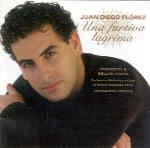By now the glories of Juan Diego Florez’s voice and the way he uses it should be well known: a stunning agility wedded to sweetness; an absolutely even register from bottom to easy, focused top; a youthful, zesty, loving approach to singing that communicates instantly; and an interest in the text that completes the operatic picture. In the past he has been criticized for producing some nasal tones, but they are nowhere to be found here. Indeed, Florez’s sound, which he is capable of darkening slightly to avoid a sameness of tone that might try your ear over a period of more than an hour, is now just right–natural, open, and skilled enough to sound conversational.
He sings nine selections here, from a sweet, gentle, unfussy rendition of the aria from which the CD takes its title to Tonio’s “A mes ami”, with its nine high-Cs, every one nailed right in its center and sounding like a note rather than an effort. He interprets Ernesto’s lament from Don Pasquale without a hint of the whining that normally comes along with it, and the high D-flat that caps its cabaletta is a beaut. “Com’e gentil” never quite works out of context and it doesn’t here either; indeed, it’s the only non-impressive piece in the recital, lacking the dreaminess it requires. Tebaldo’s recitative and aria from I Capuleti is delivered with strength and conviction, and the cabaletta has plenty of passion. A scena from the recently discovered Elisabetta proves itself fascinating, and it’s good to hear it sung with conviction. (The accompanying notes tell us nothing about the opera itself. In fact, it is a revised version of the composer’s Otto Mesi in due Ore, also known as L’esiliati in Siberia. The score was found in a basement in Covent Garden in 1984.)
Florez’s smooth legato and morbidezza are in evidence in Arturo’s “A te o cara”, and for once the huge leap to high C-sharp is elegant and expressive rather than a lunge. A scene from La sonnambula exhibits the tenor’s ability with exclamatory singing, and he manages to express the character’s anger and grief (not to mention those remarkable high notes again). Last, but first on the recital, is an oddity from Donizetti’s Rita, in which the singer giddily expresses his joy at being a bachelor again. It’s a sheer delight and you’ll want to hear it again the moment it’s over.
Decca has provided a classy frame for Florez: conductor Riccardo Frizza seems to really know his bel canto, his orchestra plays handsomely (including the difficult horn solo in the first Don Pasquale aria), and a chorus and supporting singers are provided to make scenes complete. The chorus is good; the less said the better about the lackluster soprano who sings Amain and Elvira; and the others are good enough. This is a major CD by a major artist–a must for lovers of great tenorizing. [2/12/2003]
































